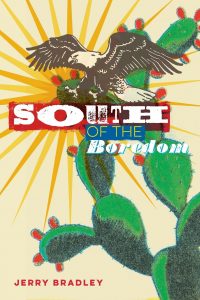Jerry Bradley: Review by Matthew Brennan

Jerry Bradley, South of the Boredom (Angelina River Press)
Jerry Bradley, a member of the Texas Institute of Arts and Letters, has previously published three well-received books of poetry that typically address what reviewer Clay Reynolds has called “the disasters of everyday life.” Bradley’s tone is sometimes ironic, sometimes poignant, sometimes both, and his form usually follows the conventions of free verse but is always well-crafted and occasionally traditional. In his new collection, however, the native Texan trains his singular gaze on the borders between his everyday life and the Mexican culture that both intersects and juxtaposes it.
A few pages into South of the Boredom, readers encounter “Perusing the Spanish Dictionary,” a poem that unfolds the poet’s approach to his subject. Wanting to immerse himself in the language of the people with whom he shares landscape and border, Bradley tries to learn “the trick of getting each word to resay / itself in an exotic, liquid tongue.” Both expectant tourist and sympathetic neighbor, Bradley inevitably fails to cross the cultural border and “put[s] the damned thing away.” The unbridgeable tensions of this inconspicuous English sonnet embody the rest of the book’s good intentions and heartfelt, if often wry and sometimes brutal, disconnections.
A good example comes in the opening poem, “The Kentucky Club, Juarez,” its very title rubbing together two disparate but intermingling worlds. “The margarita was born / just across the Santa Fe bridge,” we’re told, and thus fittingly the club entertains not only Jack Dempsey and Marilyn Monroe but also Chapo and soldiers stationed “where the jukebox / like the killings never wants to stop” [.] This image of benumbed, ongoing horror fits into a poem of beautiful symmetry, its free-verse lines grouped into segments of two lines, then 3-1-3-2. As so often in Bradley’s skilled hands, the shape and substance of the poem merge into a complex whole.
Many of the 43 poems are mythic and historical. Bradley attempts to move beyond the lazy tourist’s easy ignorance of how past and present collide. “On the Highway of the Sun” vividly describes “the most beautiful 165 miles / in Mexico’s financial death march,” presenting a “sugar mill / Cortes built on slavery,” but concluding with “donkey-eared” tourists “like us” driving on “and dreaming that Coronado’s gold / glistens just beyond / the horizon where even this road ends.” Though wanting only to imbibe Mexico’s beauty, the tourists can’t help some sense of complicity in history’s conquest of this beauty, or so the poem seems to suggest. The lost culture glimmers with faded glory in “The First Death of Frida Kahlo,” “The Ruins of Tulum,” and “How an Ant Saved the Aztecs.” But in “The Lagoon of Xel-Há,” “Free in the Wild,” and “Boys’ Town, Ciudad Acuña,” the speaker indulges in superficial, guilt-edged tourism. For instance, in the latter poem he compares “the doors at the Palacio de Oro” to “the women here” who “swing both ways,” and he unconvincingly describes himself as “not just another mongrel / trying to outlast / a bottom-of-the-bottle life” before beating “it back to Del Rio / disregarding the fallen night.” This final image forms an effectively resonant objective correlative.
However flawed these speakers can be, Bradley generates genuine feeling for the dream-shattered Mexicans and raises a timely cautionary warning. One of the best poems here, “The Chile Fields of Guanajuanto,” catalogs the migrants and the produce they pick in Jalisco, Veracruz, Chiapas, and Baja. Yet the poem closes darkly in Guanajuanto where the hapless are “crushed by a tractor / or pitched from an open bed” while “The survivors sleep on hard floors, snore, / rule only the abandoned empire of their dreams.” And of course what many of them dream of, we understand, is crossing the border, a dream forming the nightmare of many immigrant-phobic Americans. The concluding poem, “Pick Up Your Pencils,” deftly evokes how Bradley learned this phobia years ago in a grade-school geography lesson. The poem ends:
We’ve heard the warnings:
refugees from Louisiana or worse
are heading this way.
Mexico is due south. There
the sons of garbagemen
play drums.
The Alamo can no longer
keep them back; our pencil boxes
no longer hold everyone’s dreams.
With wise indirection, these lines convey both childish prejudice and the stark reality that our political and cultural borders are grand illusions, that our identities and our defenses, personal and national, are much less fixed than we sometimes like to think. In South of the Boredom Bradley embraces America’s ambiguous, multiple relations to Mexico and itself, achieving an admirable clarity of image and form, even if sometimes, like the poet, we need the aid of the Spanish dictionary.
Matthew Brennan‘s most recent books of poetry are One Life (Lamar University Literary Press, 2016) and The House with the Mansard Roof (Backwaters Press, 2009). His poems and criticism have appeared in such journals as Valparaiso Poetry Review, Commonweal, Blue Unicorn, New York Times Book Review, Sewanee Review, and South Carolina Review.